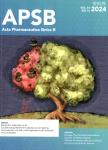M1-polarized macrophage-derived cellular nanovesicle-coated lipid nanoparticles for enhanced cancer treatment through hybridization of gene therapy and cancer immunotherapy
作者机构:Department of Integrative BiotechnologySungkyunkwan University(SKKU)SuwonGyeonggi 16419Republic of Korea Deparment of Inteligent Precision Healthcare ConvergenceSKKUSuwonGyeonggi 16419Republic of Korea Department of MetaBioHealthSKKU Institute for ConvergenceSKKUSuwonGyeonggi 16419Republic of Korea Department of BioengineeringHanyang UniversitySeoul 04763Republic of Korea Department of Integrative EngineeringChung-Ang UniversitySeoul 06974Republic of Korea Department of Biomedical EngineeringSKKUSuwonGyeonggi 16419Republic of Korea Korea Institute of Science and Technology(KIST)Seoul 02792Republic of Korea
出 版 物:《Acta Pharmaceutica Sinica B》 (药学学报(英文版))
年 卷 期:2024年第14卷第7期
页 面:3169-3183页
核心收录:
学科分类:0831[工学-生物医学工程(可授工学、理学、医学学位)] 1002[医学-临床医学] 08[工学] 100214[医学-肿瘤学] 0836[工学-生物工程] 10[医学]
基 金:supported by a Basic Science Research Program grant through the National Research Foundation of Korea(NRF)grants(Nos.2021R1A2C4001776,RS-2023-00218648,RS-2023-00242443,and 2023-00208913)of the Republic of Korea funded by the Ministry of Science and ICT(MSIT)of the Republic of Korea a grant of the Korea Health Technology R&D Project through the Korea Health Industry Development Institute(KHIDI) funded by the Ministry of Health&Welfare,Republic of Korea(No.RS-2023-00266015) the KIST Institutional Program(No.2E32351-23-130)of the Republic of Korea
主 题:Genetic-immunotherapy M1 macrophage-derived cellular nanovesicles Lipid nanoparticles(LNPs) Gene therapy siRNA Cancer immunotherapy Solid tumor Tumor microenvironment(TME)
摘 要:Optimum genetic delivery for modulating target genes to diseased tissue is a major obstacle for profitable gene *** nanoparticles(LNPs),considered a prospective vehicle for nucleic acid delivery,have demonstrated efficacy in human use during the COVID-19 *** study introduces a novel biomaterial-based platform,M1-polarized macrophage-derived cellular nanovesicle-coated LNPs(M1-C-LNPs),specifically engineered for a combined gene-immunotherapy approach against solid *** dual-function system of M1-C-LNPs encapsulates Bcl2-targeting siRNA within LNPs and immune-modulating cytokines within M1 macrophage-derived cellular nanovesicles(M1-NVs),effectively facilitating apoptosis in cancer cells without impacting T and NK cells,which activate the intratumoral immune response to promote granule-mediating killing for solid tumor *** retention within tumor was observed upon intratumoral administration of M1-C-LNPs,owing to the presence of adhesion molecules on M1-NVs,thereby contributing to superior tumor growth *** findings represent a promising strategy for the development of targeted and effective nanoparticle-based cancer genetic-immunotherapy,with significant implications for advancing biomaterial use in cancer therapeutics.




